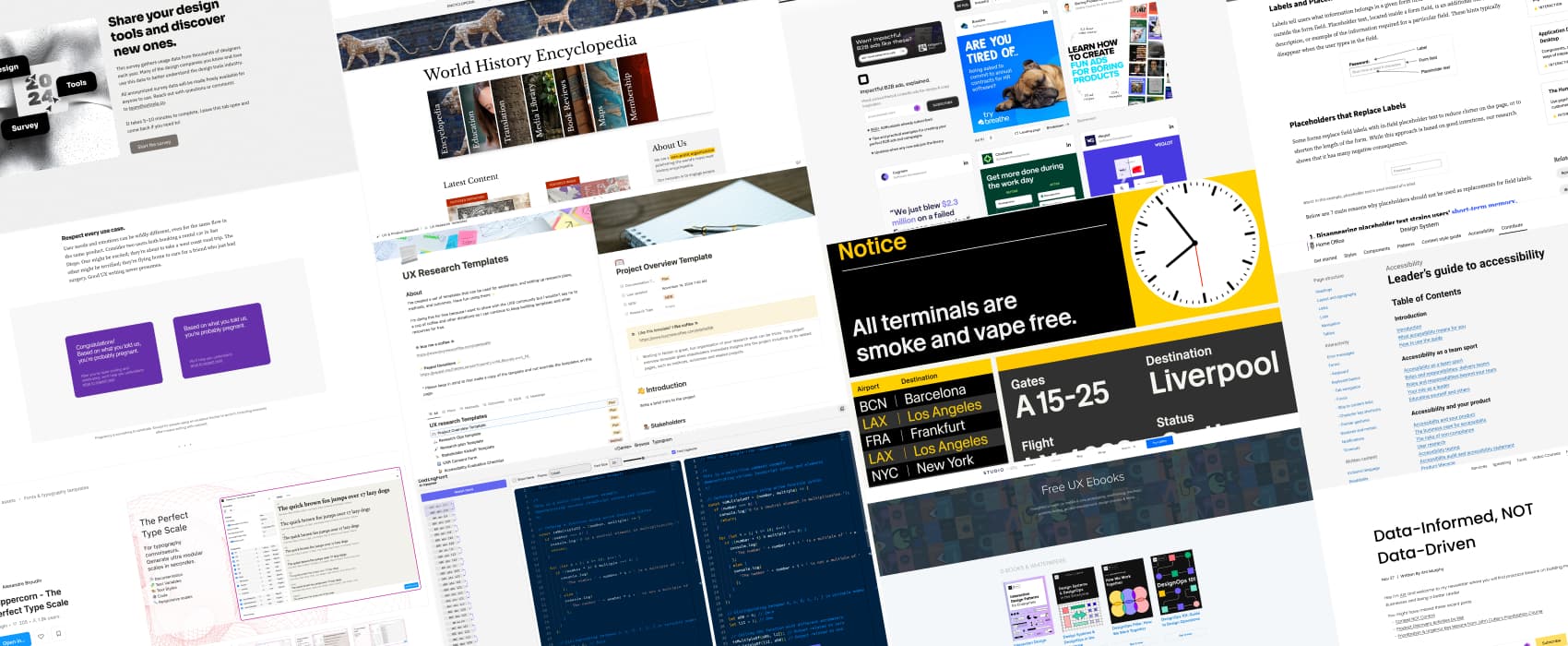
Pixels of the Week – December 8, 2024
Data-informed design, inclusive writing and free UX templates & books
My curated weekly-ish online newsletter, where I share interesting articles, tools, and resources I found during the week. You can expect content about UX, design, user research, accessibility & tech, but also some processes, some inspiration, sometimes books, and a couple of videos and podcasts. Also, don’t forget to, subscribe to the newsletter to get notified, you will get the weekly links directly in your mailbox, and be notified when I publish other articles.
Now: what I’m currently up to
I’m currently working behind the scene on a couple of collaborations to bring my resources to me people. So, if you are doing an advent calendar with design gifts, I’m open to doing partnerships for UX templates from my shop, please reach out!
Most popular content this week
Data-Informed, NOT Data-Driven (8min) “If you torture the data long enough, it will confess to anything” – Ronald H. Coase. This is why it’s important to be data informed, and use data as supporting tool, not absolute truth, because data can be biased too, from collection to interpretation, incomplete information. by Ant Murphy
Interesting articles that caught my attention
- How to help your team navigate Product Discovery and work with executives (10min) 3 questions you want to ask stakeholders during discover meetings to maximize your impact as a designer, clear ambiguity and foresee potential issues: Why is this important? What don’t I know? Who can I talk to about this? By Christopher K Wong
- How to write inclusive, accessible digital products (8min) some nice advice to make interfaces useable for everyone by Nick DiLallo: write clearly, use inclusive language, respect every use case and don’t make assumptions about people’s backgrounds, use neutral placeholder text, write clear CTAs (even if they don’t sound fun), write without formatting (bold, italic) because your writing should make sense when colors and style are gone, use words that make sense for every interface (ditch click, tap, on the right, etc), add alt text and captions. Last but not least: read your writing out loud. Also, don’t forget to check his other article This is good UX writing.
- Placeholders in Form Fields Are Harmful (5min) Don’t use placeholders instead of labels. They disappear when users start typing, placing unnecessary strain on memory, causing confusion, and making it hard to identify or fix errors. This is even worse for people with accessibility needs. If you use them for hint, inside the label, remember that they vanish when user starts typing, so, it still causes issues.
Curiosity cabinet: non-design/tech rabbit holes I enjoyed
World History Encyclopedia maintained by a non profit organization. You can search by index, topics but also maps, timelines. An awesome tool for education.
Inspiration: fun experiments, beautiful art, and great ideas
Airport typeface: an illustrated story of the design of Airport, a typeface designed by by Matthew Carter in 1961 for London Airport. Lukas Schneider re-created a modern version of the font, available in 2 versions: Airport and Airport X
Useful tools & resources
- Leader’s guide to accessibility: Accessibility is a team sport, and we need leadership onboard to push things forward. Gov.uk published that guide to help anyone with responsibility for a digital team, product, or service work out what each role in their team plays what roles in making products/services accessible. Also check Introducing the Leader’s Guide to Accessibility for more information on the project.
- Coding Font: compare coding fonts 2 by 2 in a couple of rounds until you find the one that you’ll love coding with. Project by Typogram team of @DesignJokes & @HuaTweets, collaboration with @octref
- Adfolio Very niche, I know, but if you’re working in marketing and your job is to create 2B2 LinkedIn (or Meta) ads, there is an inspiration gallery for you too. It’s honestly not easy to make B2B ads interesting.
- Peppercorn a Figma plugin to build typography scale, with different scaling factors, but also the corresponding Figma variables
- Seismic Explorer a map of all the earthquakes since 1980, starting from magnitude 5
- Free Notion UX Research resources: Odette Jansen created a set of Notion templates to help you plan and run UX sessions (project overview, stakeholder kickoff, diary study, card sorting, contextual inquiry and more.)
- The annual UX tools survey is out and it needs your help to get more data. If you have 5 minutes don’t forget to fill the form.
Books
Free UX e-Books: a collection of many free e-books curated by UX-pin